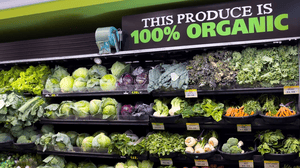Food retailing 2025: Shoppers still want the basics, and then some
What will the grocery shopper of tomorrow want from their supermarkets?
June 11, 2014
What will the grocery shopper of tomorrow want from their supermarkets?
Many of the same things they want today, as it turns out — including a smoother checkout experience, a more personalized relationship with their store, and more helpful product information.
After surveying more than 1,000 grocery shoppers for its new report, “Front of the line: How grocers can get ahead for the future,” PricewaterhouseCoopers concluded that shoppers do like shopping at their supermarkets already, but there are some basic things they wish their stores would do better. The report is being released this week at FMI Connect as part of the Retail Experience of the Future exhibit on the show floor.
“An overwhelming number of respondents said they want the mundane stuff,” said Sabina Saksena, managing director, PwC, in an interview with SN, citing faster checkout, easier access to parking and less clutter in the aisles. “They want their shopping experience to be more convenient.”

Sabina Saksena
Beyond that, supermarkets also should consider rewarding shoppers for purchasing more healthful foods, providing more transparency and information about the products they carry, and leveraging technology and store design to simplify the experience. The report found that overall, shoppers want their grocery shopping to be more personalized.
“Shoppers are saying they want their supermarket to know ‘who I am and what I want,’” said Saksena. “Personalization is key. Retailers have to start thinking about data-driven insights.”
For example, nearly 60% of respondents said they see custom coupons as the best way to simplify their future shopping. Shoppers also want more control over their loyalty-program rewards, with 83% saying they would like more flexibility in how they earn and spend points.
“Loyalty in the future will be focused on value creation and shopper relevance,” the report concluded.
In addition, as affordable natural and organic products become more ubiquitous, supermarkets “must act as gatekeeper to uphold the standards of the assortments” in their stores, the report said.
“Trust and authenticity is very important,” Saksena said, citing a need for transparency, and for an educated, well-trained staff that can assist shoppers in making informed decisions about such product.
The report divides shoppers into four groups based on their responses: Gourmet Gordon, Metropolitan Marsha, Traditional Tim, and Millennial Mel, with breakdowns for each detailing household income, shopping habits and average spend per grocery store visit.
• Gourmet Gordon — representing 33% of shoppers surveyed — is most likely to choose a retailer based on sustainability, and is likely to read labels carefully.
• Metropolitan Marsha — 26% of respondents — is in a hurry, and just wants to get in and out of the store quickly, and she’s far more likely than other groups to to be interested in virtual shopping platforms at bus or subway stops.
• Traditional Tim — about 25% of respondents — spends the least per visit of any of the groups, and is also the least interested in technology. Price is his primary motivation.
• Millennial Mel — 17% of respondents — is the youngest group, is most interested in social media, and is also most likely to want more options in her loyalty program.
Another key finding in the report was the fact that the brick-and-mortar supermarket “is here to stay,” said Saksena, citing the low acceptance of online grocery shopping — only 1% of respondents said online grocery shopping is their primary method of purchase, while 92% have access to the service. Only 5% of respondents cited online shopping among their top three shopping options for the future.
Half of the respondents said the main reason they do not shop online is that they cannot see the product in-person.
Follow @SN_News for updates throughout the day.
Retailers do need to prepare for the impact of online grocery shopping in the areas where it is gaining traction, but they also must recognize that brick-and-mortar is not going away anytime soon, Saksena said.
Among other conclusions from the report:
• Shopper expect information at their fingertips: Almost 30% shoppers expressed interest in store-provided devices and kiosks, but shoppers preferred using their personal devices over in-store devices by nearly 90%. And if they were to purchase groceries online, 75% said they would use personal devices to do so.
• Almost 70% said they eat ethnic food six or more times per month, and “interest in food from different cultures may only increase as shoppers are exposed to more diversity,” the report concluded.
About the Author
You May Also Like






